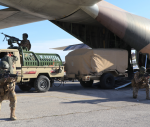You are here
Hagel’s resignation and region’s tribulations
Nov 26,2014 - Last updated at Nov 26,2014
The Monday resignation of US Defence Secretary Chuck Hagel followed President Barack Obama’s curious clarification of his stance on Syrian President Bashar Assad.
Addressing media on November 16, on the sidelines of the G-20 summit in Brisbane, Australia, Obama dismissed the possibility of an alliance against the Islamic State, but said something of greater import.
He sidestepped the IS issue by saying: “... we are looking for a political solution… that is inclusive of all [Syrian] groups. And, at some point, the people of Syria and the various players involved [Turkey, Iran, Russia and others] are going to have to engage in a political conversation.”
Asked if he was discussing the ouster of Assad while making plans for a political transition, Obama replied: “No.”
To sum up his position: Obama will not cooperate with Assad in fighting IS in the civil war, but will not actively seek to topple him through political means either.
This is, of course, an odd position to adopt.
Nevertheless, his “no” appears to signify a significant shift in his policy from striving to overthrow Assad through a combination of proxy paramilitary and political means to retaining him as an interlocutor in negotiations on a political settlement for Syria.
Frustrated with what he believed was the White House’s failure to forge a clear policy on Assad, Hagel sent a two-page memorandum in early October to Obama’s national security adviser Susan Rice.
In it, Hagel expressed concern about the administration’s strategy on Syria, saying that the US needs to have a clearer view of how to deal with the Assad regime.
He warned that lack of clarity could “unravel” the US-led campaign to contain IS and stabilise Syria.
Hagel argued that by striking IS, the US and its allies have enabled Assad’s forces to concentrate their firepower on “moderate” Syrian rebels (who do not exist in fact) in the northwest and south of the country. Hagel urged the White House to adopt a tougher line on Assad.
Without abandoning his contention that Assad is no longer the legitimate leader of Syria, Obama, apparently, reversed his policy.
While he pledged to train and arm 2,000 “moderate” rebels to fight both IS and the Assad government, the very fact that the number is so small shows that this effort is meant to be a face saver rather than a threat either to Assad or IS, which, reportedly, welcomes 1,000 new recruits a month and has amassed between 30,000 and 50,000 fighters in both Syria and Iraq.
The only forces with enough boots on the ground in both Syria and Iraq to take on, contain and ultimately crush IS are the regular militaries of these states, the Syrian army bolstered by Lebanon’s Hizbollah and the Iraqi army backed by the Iraqi Kurdish peshmerga.
The White House knows full well that there is no point in tackling IS in Iraq and driving its forces from Mosul, Fallujah and Ramadi unless IS is also expelled from Raqqa, its capital, and other conquered areas in Syria.
Having failed to lop off all the heads of the Hydra of Al Qaeda in Iraq, the US, the Iraqi security forces and the Iraqi army prepared the way for Al Qaeda in Iraq to re-emerge with a bombing campaign that killed mainly Shiite civilians and morph into the Islamic State in Iraq and, eventually, IS.
It menaces not only the region, but also countries where alienated young Muslims are radicalised by IS and inspired to take action against their governments and societies.
Secretary of State John Kerry — whose performance has, reportedly, been criticised by White House insiders — may have to adjust his approach to Syria and Iraq to accommodate Obama’s “no”.
The day after Obama uttered this all-important two-letter word, Kerry said that Damascus and IS are “co-dependent” or “symbiotic”, although hundreds of government forces and government supporters were slain by IS and the army has taken and held territory under IS assault.
Russian Foreign Minister Sergey Lavrov dismissed Kerry’s comment as illogical, particularly since it coincided with the recapture by Syrian forces of Al Shaer natural gas field from IS fighters.
The government’s view is that the Western and Arab powers backing the rebels in Syria only accepted that, at least some, are “terrorists” by classifying IS and the official Syrian Al Qaeda branch Jabhat Al Nusra as “terrorist” in nature.
“Terrorist” cults rather than groups or movements.
Kerry’s intelligent handling of the extension beyond Monday’s arbitrary deadline of the timeframe for the achievement of an agreement between Iran and the five permanent members of the Security Council plus Germany should put him in good stead with Obama, who is fully committed to this process.
After a dozen years of talks, a deal on Iran’s nuclear programme would burnish his foreign policy legacy and, as Kerry said, make the world a safer place.
A deal with Assad over IS would also make the region and the world a safer place. Such an arrangement could also provide for ceasefires between the government and warring parties, stabilisation of Syria and negotiations on a transition to democracy, in which the government could play its part as it did in the deliberations in Geneva early this year.
But this time, credible, independent Syrian opposition figures could be the government’s interlocutors rather than exiles with no support in the country.













